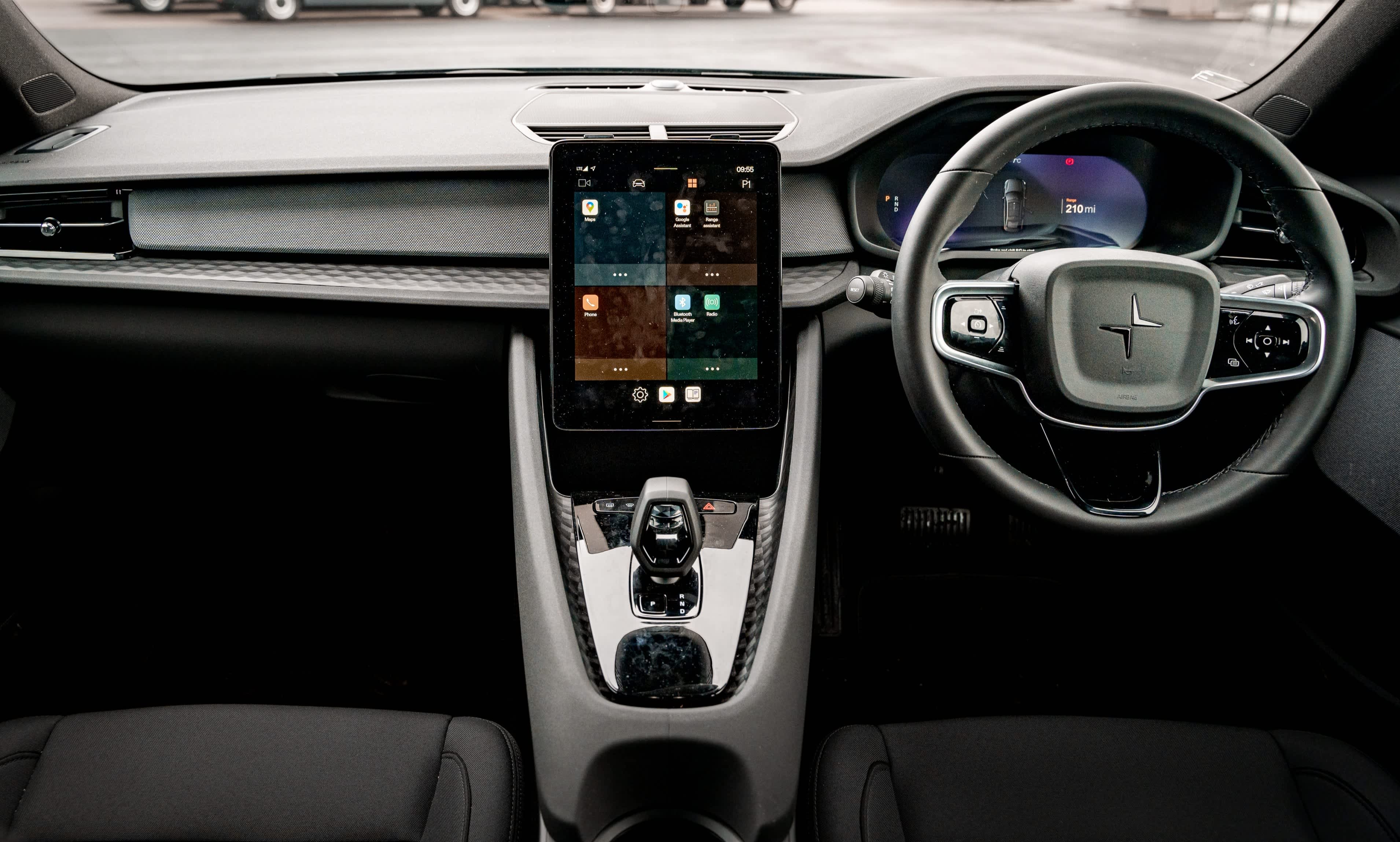Expert’s Rating
Pros
- Bluetooth speakers also work with your phone
- No fuss setup and playback
- Classic mid-century design
Cons
- Subpar vinyl digitizing
- Tracking weight is too heavy to use with valuable vinyl
Our Verdict
If you’re looking to dip a toe into the vinyl world, this Montrose and McKinley bundle is an affordable, stylish, and great-sounding way to start.
Price When Reviewed
$219.99
Best Prices Today:

$199.99

$219.99
The Bluetooth version of Electrohome’s Montrose turntable sells for $120, and the company’s McKinley wireless bookshelf speakers go for $100 a pair. Both feature a striking mid-century design and you can buy them as a bundle—as reviewed here—for a street price of $200.
Montrose and McKinley build quality
Both the Montrose and McKinley components feature MDF cabinets with a teak veneer. The Montrose turntable uses an Audio-Technica AT3600L moving-magnet, diamond-tipped conical cartridge with stylus. The cartridge is pre-installed with two screws and can be upgraded.
The turntable measures 4.8 x 15.75 x 12.68 inches (HxWxD) and weighs 7.23 pounds. It comes with a smoked gray plastic dust cover and a felt turntable mat. There’s a 45rpm adapter, a 4-ft. RCA cable with a ground wire, and an AC adapter with 5-ft cable. The turntable plays vinyl at both 33- and 45 rpm.
The McKinley speakers are 2-way, 2-driver bookshelf speakers with 1-inch silk tweeters and 4-inch polypropylene woofers. Each speaker measures 10.4 x 6.5 x 7.6 inches (HxWxD). The powered speaker weighs 5.96 pounds and the passive speaker weighs 5.74 lbs.
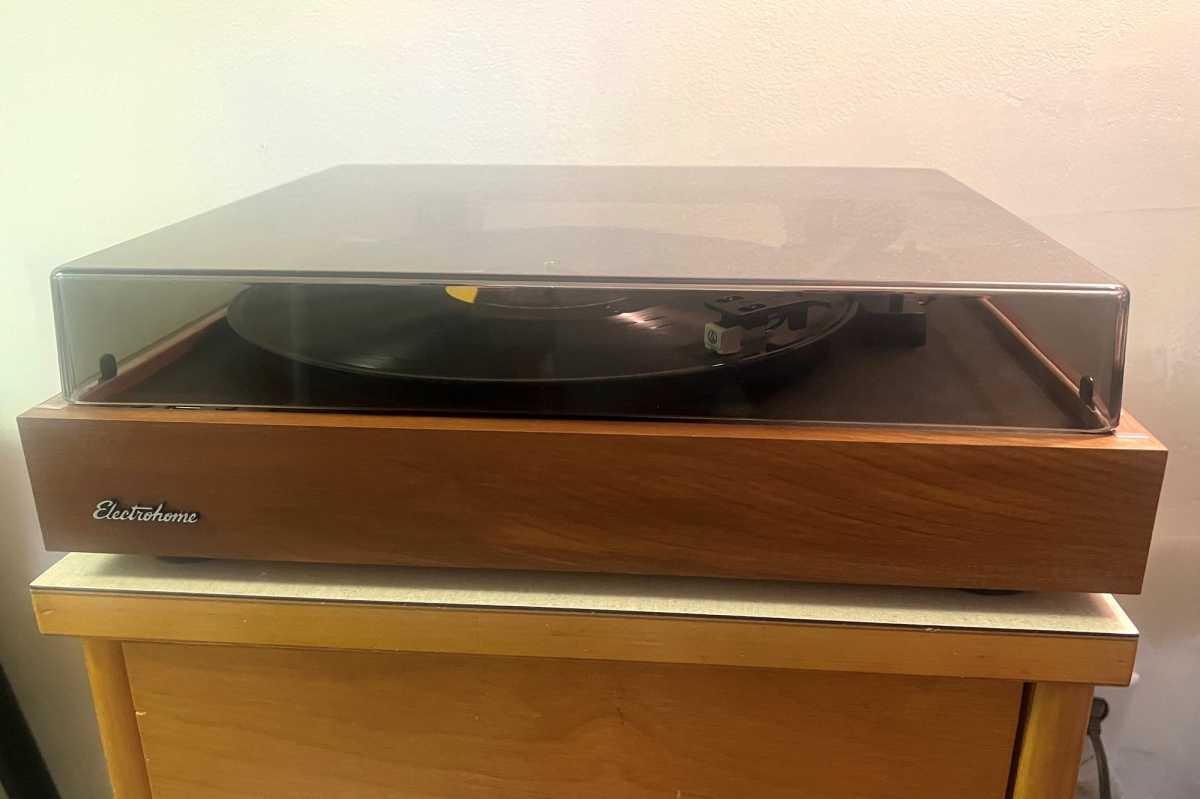
The Montrose turntable comes with an attractive and sturdy dust cover.
James Barber/Foundry
Setting up the Montrose turntable
The Montrose turntable is designed for entry-level buyers, so Electrohome aims to keep things simple: The cartridge is pre-installed, so you just slip off the protective cover, but you will need to slide the counterweight onto the tonearm.
The included manual has a sticker with new counterweight instructions that say to slide on the counterweight until it clicks twice on notches on the tonearm, and then give it one full counterclockwise turn to set the tracking to a hefty three grams.
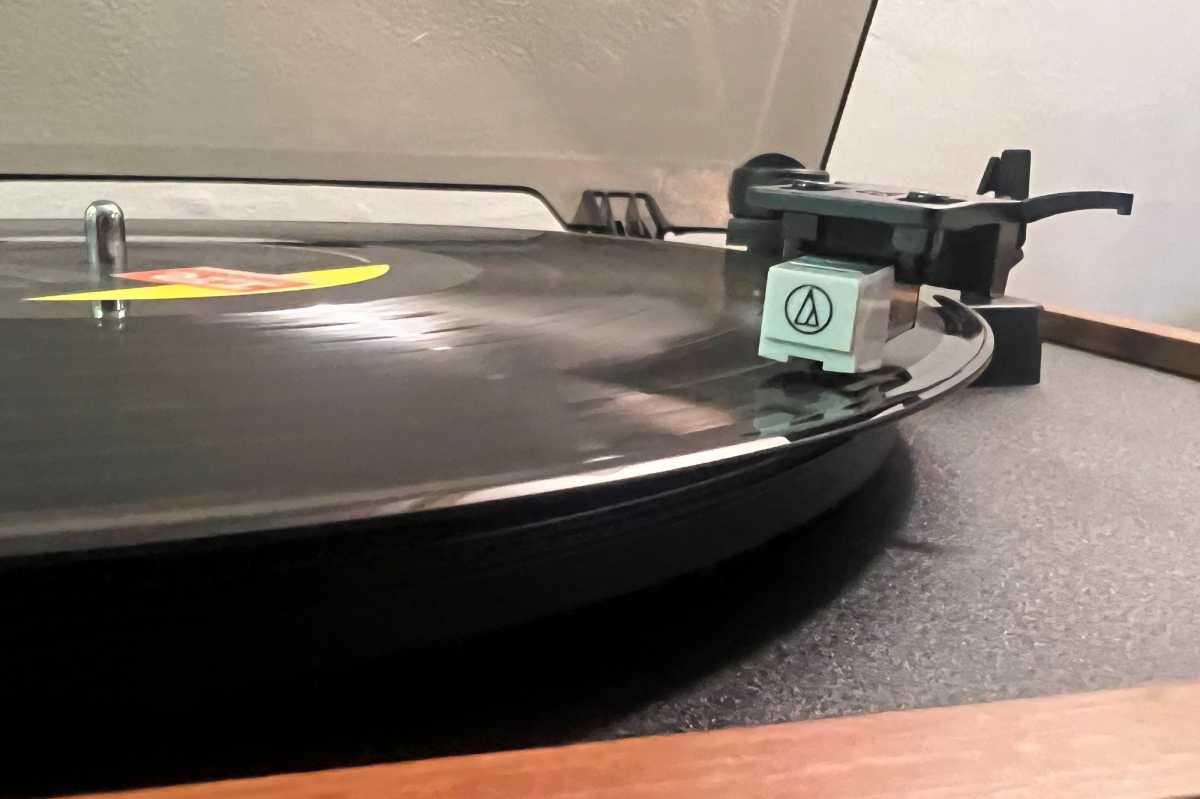
The Electrohome Montrose wireless turntable comes with an Audio Technica AT3600L cartridge.
James Barber/Foundry
This is where Electrohome’s instructions are a bit fuzzy. My brain is wired so that I turned the counterweight so that the numbers on the face turned in a counterclockwise direction. To make the numbers move in a counterclockwise direction, you must rotate the counterweight itself in a clockwise direction.
I quickly figured this out for myself, but this process will be both complicated and intimidating for anyone who isn’t familiar with balancing turntables. Fortunately, Electrohome makes excellent setup videos, and watching the video before you set up the Montrose will solve the problem.
Still, three grams. That’s a lot.
If you decide to use the Montrose with the included RCA cable, you’ll need to set its phono preamp switch to on or off, depending on whether the amp you’re plugging into has a phono stage.
To take advantage of its wireless connectivity, press its Bluetooth button until it flashes white, place the speakers (which you’ve also put in pairing mode) near the turntable, and wait for an automatic connection. The Montrose/McKinley pairing took a couple of tries, so there was a bit of patience required.
Setting up the McKinley speakers
The McKinley speakers are self-powered, but the amp is only in the right-hand speaker and it’s the only one you’ll need to plug into an electrical outlet. It has a generous eight feet of speaker wire that you’ll connect to the passive left-hand speaker. You’ll get a wireless connection to your source, but your speakers will always require wires (one to power the amp, and one to connect the two speakers).
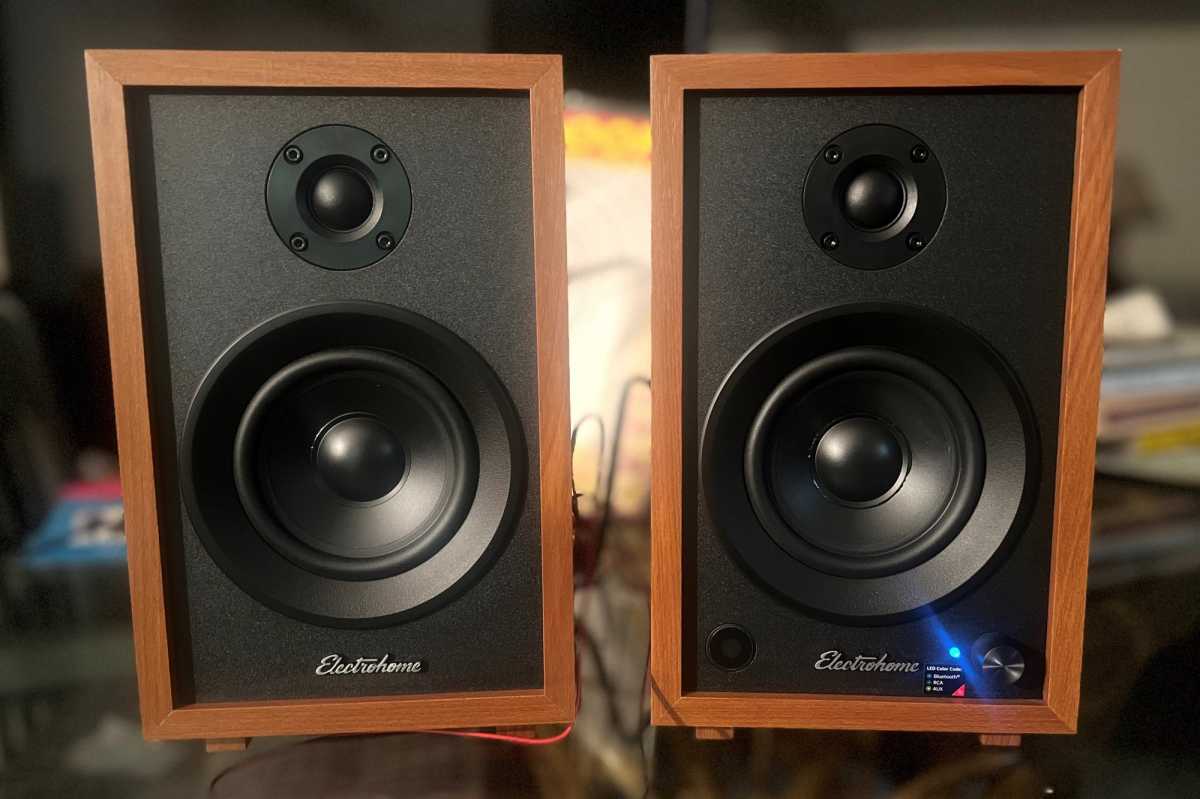
The right-hand McKinley wireless speaker plugs into the wall and powers the passive left-hand via the speaker wire that connects them.
James Barber/Foundry
The McKinley gives you multiple connectivity options: There are 3.5mm Aux and RCA inputs for an analog sources, and a Bluetooth radio for a wireless connection with the Montrose or any other Bluetooth device (e.,g. a smartphone or tablet).
A control knob on the front of the right-hand speaker lets you to switch between aux, RCA, and Bluetooth inputs. To pair, just select the Bluetooth input and it should pair automatically. If you’re having trouble getting the speakers to connect, a Bluetooth-pairing reset button on the back of the speaker that should clear up any issues.
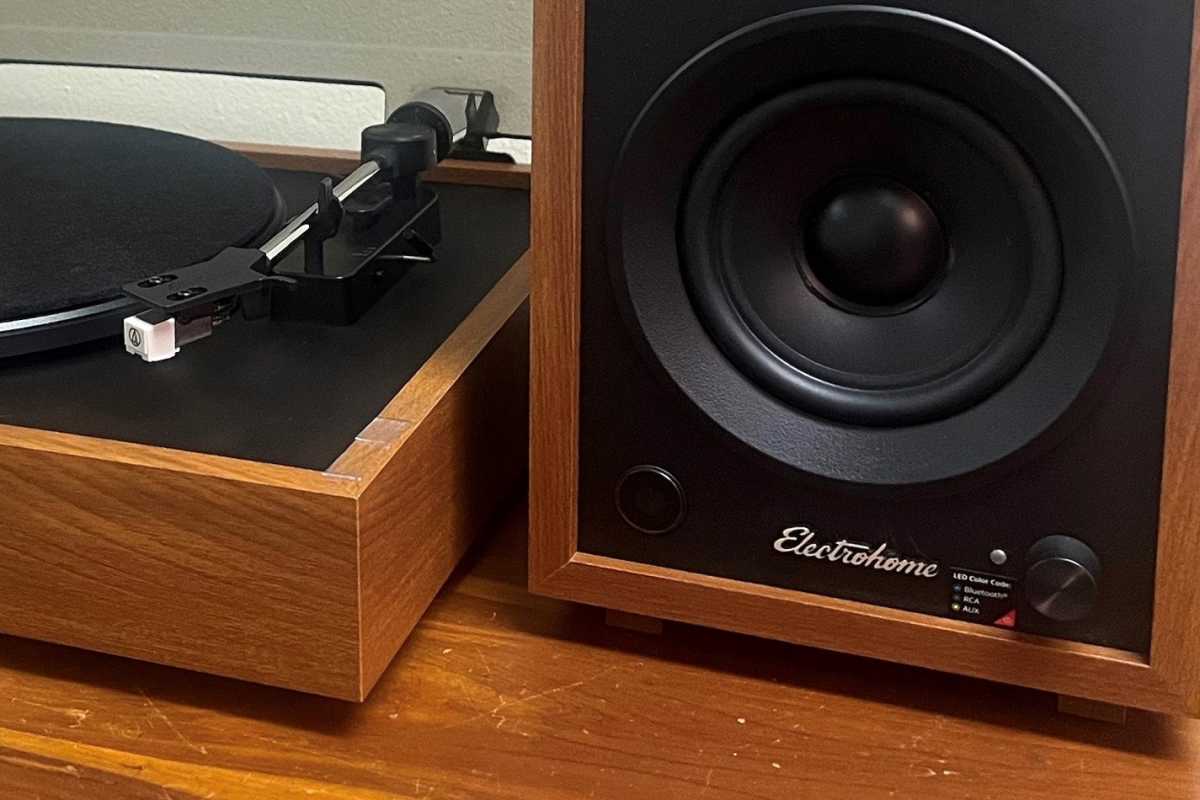
The selector knob on the right-hand speaker switches inputs from AUX to RCA to Bluetooth.
James Barber/Foundry
An IR remote control included with the speakers offers a few more controls. If you’re listening to music from a streaming service, there are play, pause, skip-forward, and skip-back buttons. You can also control volume, adjust the bass or treble, and switch between sources.
Using the Montrose to record your vinyl
You can use the Montrose wireless turntable to digitize your vinyl, but this feature is so limited that it might not be worth the trouble. It works only with an external USB drive that’s formatted FAT32. MacOS can read that format, and Mac users can use the Disk Utility app to format a thumb drive to that standard, but the process might be too advanced for the type of buyer who’ll be looking at this system.
Once the thumb drive is connected, you press the record button and play the record. When you’re done, you’ll find a single file 128Kbps MP3 file on the drive. If you want to split an LP side into individual tracks and tag them with artist and title metadata, you’ll need to do that on your computer using third-party software.
The bigger question is whether anyone wants to listen to such low-resolution files in an era when Apple’s 256Kbps AAC files or Spotify’s 320Kbps Ogg Vorbis audio files represent the floor of what everyone’s ears enjoy now. Qobuz and Tidal, meanwhile, stream at much higher resolutions. Two decades ago, everyone tolerated tracks ripped at 128Kbps; today, a file ripped at that bit rate just sounds thin.
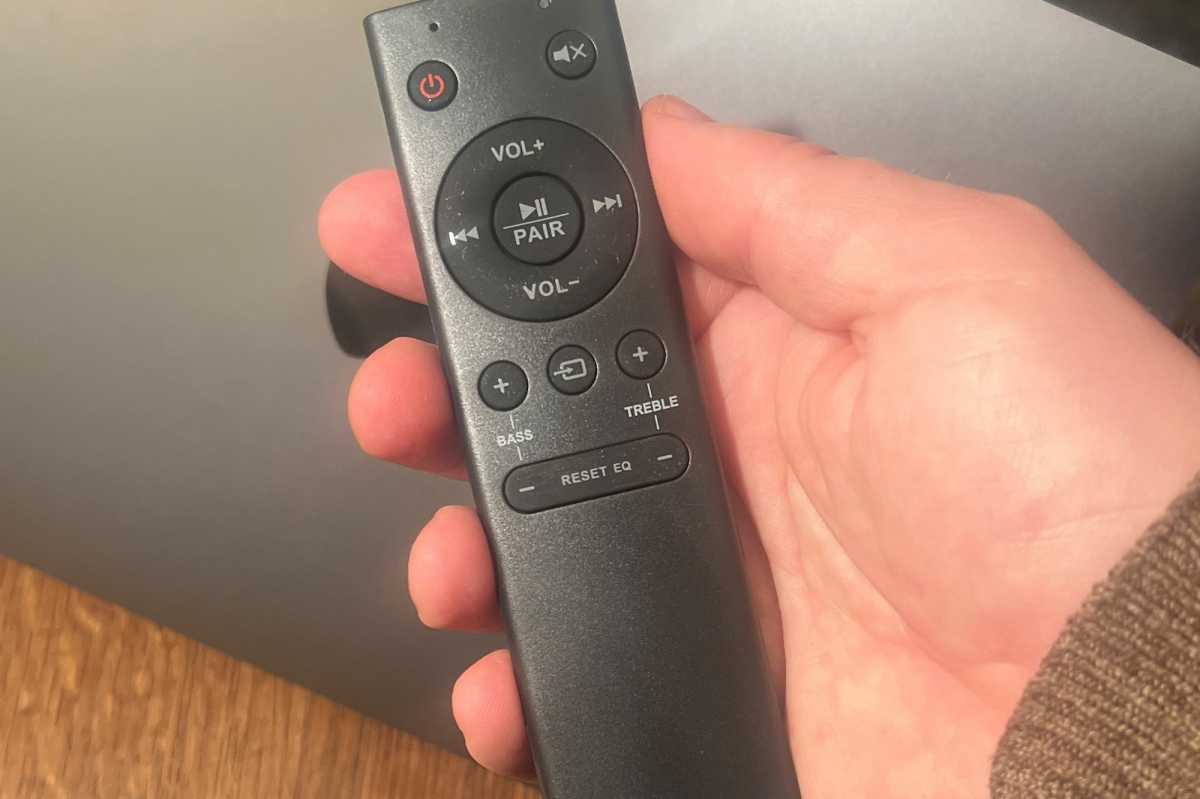
The McKinley speakers come with a wireless remote.
James Barber/Foundry
Listening to music on the Montrose/McKinley
I first tested the McKinley speakers by streaming music from an iPhone 13 Pro Max via Bluetooth. Pairing was easy; more importantly, the McKinley speakers consistently reconnected with the iPhone during testing.
These speakers deliver excellent stereo imaging for the price. The 8-foot speaker wire allows you to create a wide soundstage, but you’ll get the full effect even if you’re using them on either side of a computer monitor.
The McKinley speakers sound best with music that doesn’t emphasize the low end. The 2022 Weyes Blood album And In The Darkness, Hearts Aglow features heavily orchestrated tracks with stacked backing vocals. The speakers do a great job with this kind of rock music as well as jazz and classical.
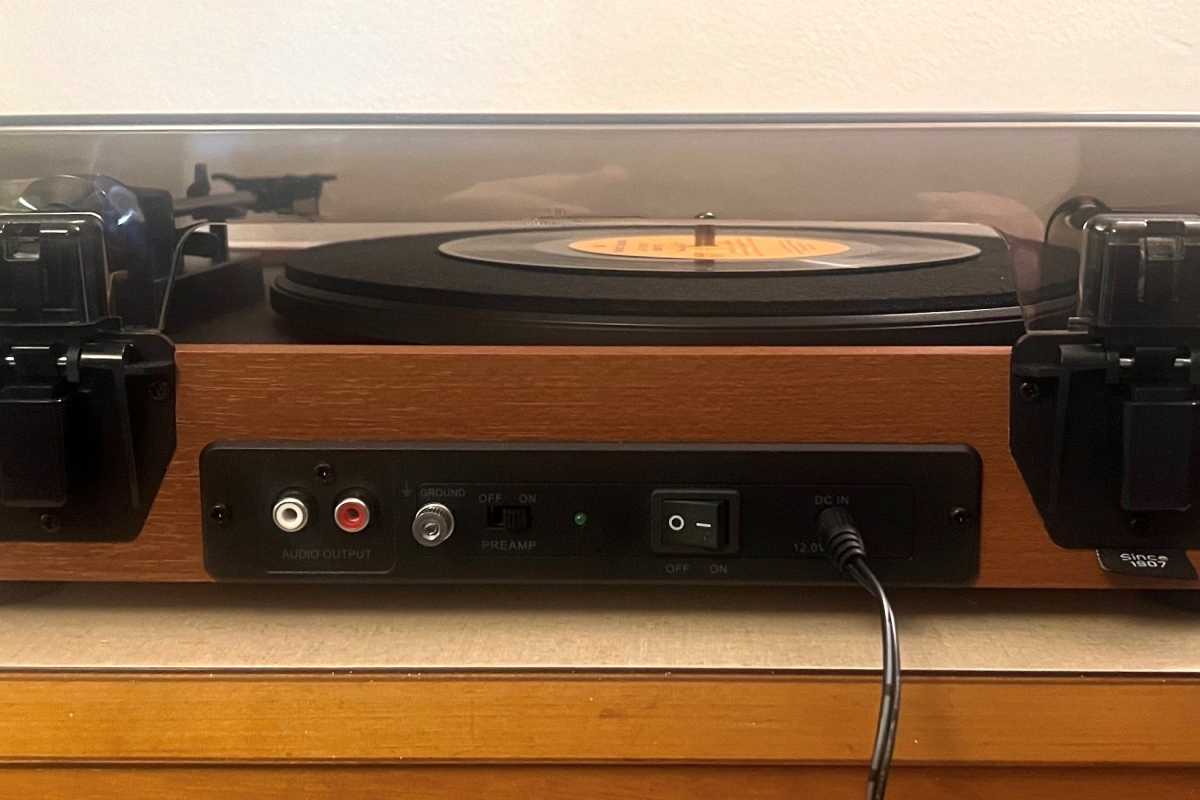
The Montrose wireless turntable can also be used wired with an RCA cable
James Barber/Foundry
With a hip-hop album like Roddy Ricch’s Feed Tha Streets III, the bass comes through, but the woofers on the McKinley don’t deliver the bone-rattling experience the artist tried to create. It’s acceptable, but not impressive.
Switching to a wireless connection with the Montrose turntable delivered even better results. The built-in phono preamp delivers a relatively loud signal to the speakers, and the stereo separation was excellent when listening to the 1962 George Barnes LP Guitars Galore, recorded with the Mercury Records Perfect Presence Sound technique that exaggerates the stereo field, so mid-century audiophiles could show off their hi-fi systems.
Johnny Rivers’ 1965 LP In Action! sounded much better with the Montrose and McKinley than I remember from when I played it on my GE all-in-one Wildcat record player back in the 1970s. This turntable and speakers combo is an excellent way to listen to a throwback vinyl collection
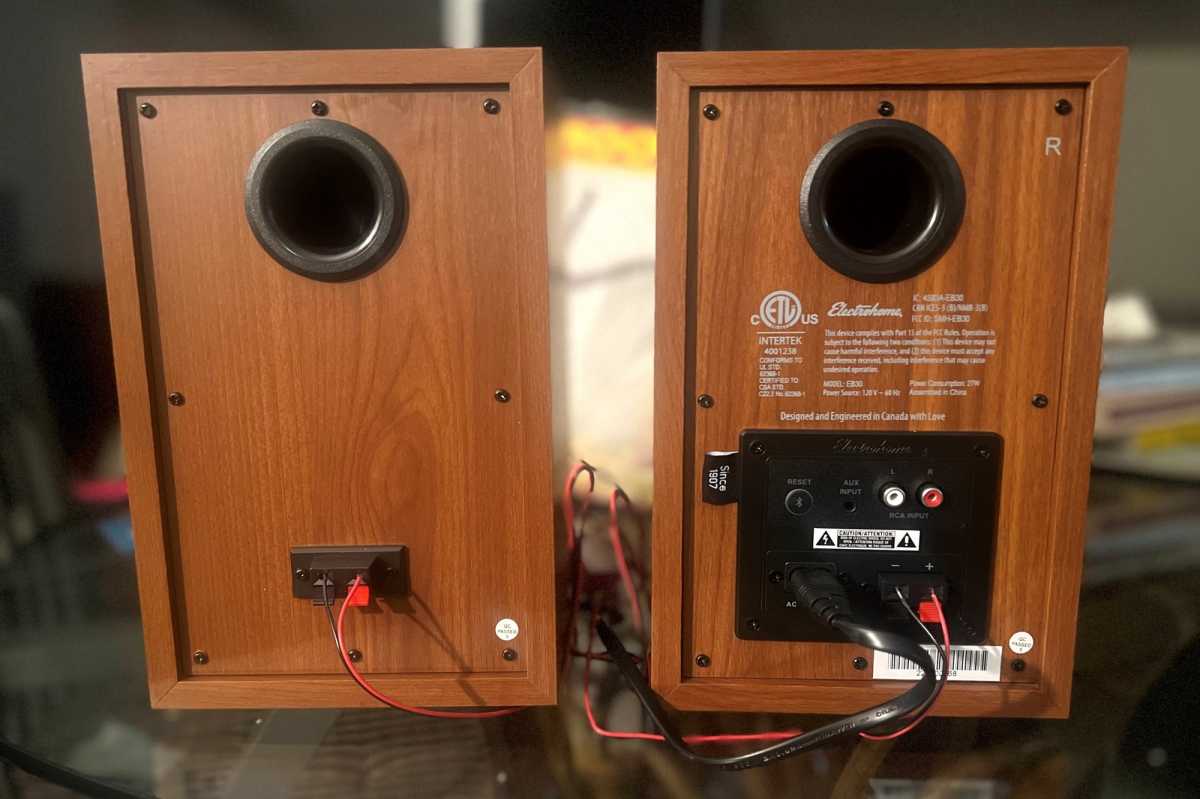
The versatile self-powered McKinley speakers can be connected to any analog source using stereo RCA cables.
James Barber/Foundry
Is the Montrose/McKinley combo a good value?
The mid-century throwback design is outstanding and the build quality on both turntable and speakers is surprisingly solid for gear in this price range. If you photoshopped these units into an image of a 70s-era living room, they would not look a bit out of place.
The system sounds excellent with rock, jazz, and classical music. The speakers can reproduce bass-heavy genres like house and hip-hop, but they won’t deliver the full low-end experience.
My recommendation, however, comes with a caveat: That tonearm tracking weight is mighty heavy. I’d hesitate to play any valuable LPs or 45s on the Montrose. It won’t destroy anything on first listen, but over time, a cartridge riding that low will wear down the grooves.
Most of us who grew up at the height of the LP era started by using record players that tracked at sometimes even heavier weights, so Electrohome isn’t out of line building a unit that tracks at this weight. It’s a decision that helps users not familiar with the hazards of vinyl, since records are going to play through a lot of chips and warping with this design.
The Montrose turntable and McKinley speakers would make an excellent first stereo system. It’s easy to set up, easy to use, and the speakers can double as a true stereo option for Spotify or other music streaming.




